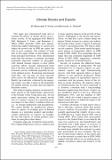Climate Shocks and Exports
Author(s)
Olken, Benjamin A.; Jones, Benjamin F.
DownloadOlken_Climate shocks.pdf (77.81Kb)
PUBLISHER_POLICY
Publisher Policy
Article is made available in accordance with the publisher's policy and may be subject to US copyright law. Please refer to the publisher's site for terms of use.
Terms of use
Metadata
Show full item recordAbstract
This paper uses international trade data to
examine the effects of climate shocks on economic
activity. At the aggregate level, Melissa
Dell, Benjamin F. Jones, and Benjamin A.
Olken (2008) (hereafter, DJO) have demonstrated
that higher temperatures in a given year
reduce the growth rate of GDP per capita, but
only in poor countries. The analysis of trade
data in this paper builds on that finding, with
three principal motivations. First, international
trade links the fortunes of countries, providing
potentially important conduits for geographically
limited climatic impacts to have global
economic effects. Second, international trade
data is the best available source for identifying
economic activity worldwide separately by narrowly
defined sectors. Examining international
trade data, one can thus say more precisely
what sectors are affected by climatic changes.
Finally, the trade data, collected by the importing
country, provides a check on the potentially
low-quality national accounts data provided by
the home country.
Date issued
2010-05Department
Massachusetts Institute of Technology. Department of EconomicsJournal
American Economic Review
Publisher
American Economic Association.
Citation
Jones, Benjamin F, and Benjamin A Olken. “Climate Shocks and Exports.” American Economic Review 100.2 (2010): 454-459. © 2011 AEA
Version: Final published version
ISSN
0002-8282